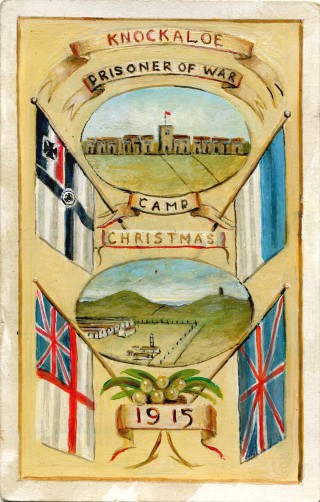
Photo Credit: Mannin Collections Archive
Panikos Panayi, Professor of European History at De Montfort University, Leicester, writes that “While former German prisoners held on to their memories after the war, Britons quickly forgot about them, focusing instead upon the former internees of Ruhleben and the other German camps. The popular Germanophobia of the Great War, which had resulted in mass deportation of German civilians at the end of the conflict, would survive well beyond 1918. One of the few Britons who tried to preserve the experiences of German internees was the Manx writer Hall Caine (1853-1931), who published The Woman of Knockaloe in 1923.”
At the outset of the project back in 2011, despite many postings on genealogy/family history sites of individuals seeking information about relatives interned in the camp on the internet, there appeared little information available and certainly no overall central database of what is currently known. It was believed that very few records of individual internees had survived from the First World War. Most of the information about Knockaloe was transferred to London after the camp closed, and stories suggest its destruction both in the Blitz of WW2, and in a cull of information in the 1960's. Fragmented information remained, held in archives such as the UK National Archives, buried within documents which were not digitised and cannot be downloaded and would need work to bring onto a central digital database. No digital information was available from Island based museums or sites.
Interest in the centenary of the First World War led to increased interest in families seeking more information and so the charity felt it was an appropriate time for the Island to develop the definitive central record of these temporary residents on its shores over that period, and the life they experienced here, both for individuals wanting to visit Knockaloe and for those wanting to search for this information on-line from off Island.
As the central location for the Knockaloe Visitors Centre, Patrick Schoolrooms became the ideal solution to collate a central record/database for those searching for details of relatives who temporarily lived on the Island during WW1, allowing those visiting the Island and the Knockaloe site to find out more, becoming part of a visit to the site to understand both sepecific details about a family member, and contextual details about the internees and their famiies, as well as those guarding them and supporting the Camp.
To find out more about how we have brought information together during the years since 2011 go to our 'Collections and Collations' page within our 'Visitor Centre' section.
Our Charity, via its work at the Centre, reaches out to families around the world to collate their stories, within family papers and oral histories, to share information collated fom other sources to help families find out more, and to retell them to schoolchildren and adults alike, in the hope that these human experiences are remembered, and that the lessons of the past are never fogotten.